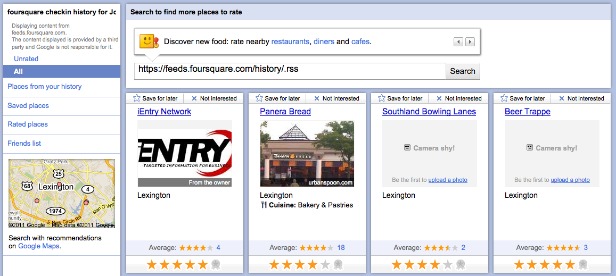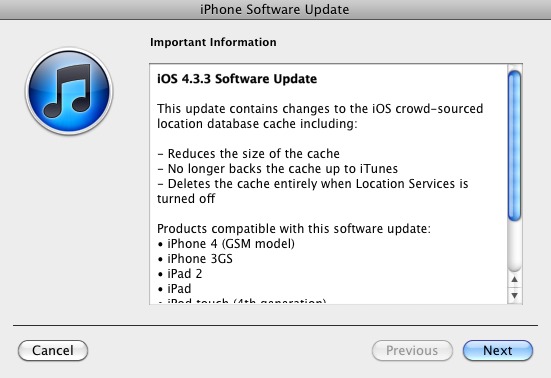Apple is not tracking the location of your iPhone. Apple has never done so and has no plans to ever do so.
This is the unequivocal opening statement from Apple’s official release this morning. This marks the first official response from the company since the iPhone tracking location data snafu.
Of course by now you know that last week two data scientists presented information on a hidden data file on iOS devices that was storing location data that reached as far back as one year. Although there was no indication that this specific data was being directly sent to Apple or any other party, the data was unprotected and unencrypted so it raised privacy concerns.
Apple, as well as Google have admitted in the past to collecting anonymous random location data for the purposes of improving upon its location database. But logging all of that info into a single file was ominous news for some.
Earlier this week, an email surfaced that purported to be a conversation with Steve Jobs about the issue, but the validity of that correspondence wasn’t confirmed. The response did sound snarky enough to be Mr. Jobs, however.
In today’s official release from Apple, they address the particular data file that was found to be storing location data. Apple states that the reason it exists is to assist location calculating. They blame a bug on the fact that it has been logging data as far back as one year.
6. People have identified up to a year’s worth of location data being stored on the iPhone. Why does my iPhone need so much data in order to assist it in finding my location today?
This data is not the iPhone’s location data—it is a subset (cache) of the crowd-sourced Wi-Fi hotspot and cell tower database which is downloaded from Apple into the iPhone to assist the iPhone in rapidly and accurately calculating location. The reason the iPhone stores so much data is a bug we uncovered and plan to fix shortly (see Software Update section below). We don’t think the iPhone needs to store more than seven days of this data.
On Monday, it was also found that the iPhone was logging your location data even if you disabled location services in the settings. Apple also says that this is a bug, and will be fixed.
Here is Apple’s full statement:
Apple would like to respond to the questions we have recently received about the gathering and use of location information by our devices.
1. Why is Apple tracking the location of my iPhone?
Apple is not tracking the location of your iPhone. Apple has never done so and has no plans to ever do so.
2. Then why is everyone so concerned about this?
Providing mobile users with fast and accurate location information while preserving their security and privacy has raised some very complex technical issues which are hard to communicate in a soundbite. Users are confused, partly because the creators of this new technology (including Apple) have not provided enough education about these issues to date.
3. Why is my iPhone logging my location?
The iPhone is not logging your location. Rather, it’s maintaining a database of Wi-Fi hotspots and cell towers around your current location, some of which may be located more than one hundred miles away from your iPhone, to help your iPhone rapidly and accurately calculate its location when requested. Calculating a phone’s location using just GPS satellite data can take up to several minutes. iPhone can reduce this time to just a few seconds by using Wi-Fi hotspot and cell tower data to quickly find GPS satellites, and even triangulate its location using just Wi-Fi hotspot and cell tower data when GPS is not available (such as indoors or in basements). These calculations are performed live on the iPhone using a crowd-sourced database of Wi-Fi hotspot and cell tower data that is generated by tens of millions of iPhones sending the geo-tagged locations of nearby Wi-Fi hotspots and cell towers in an anonymous and encrypted form to Apple.
4. Is this crowd-sourced database stored on the iPhone?
The entire crowd-sourced database is too big to store on an iPhone, so we download an appropriate subset (cache) onto each iPhone. This cache is protected but not encrypted, and is backed up in iTunes whenever you back up your iPhone. The backup is encrypted or not, depending on the user settings in iTunes. The location data that researchers are seeing on the iPhone is not the past or present location of the iPhone, but rather the locations of Wi-Fi hotspots and cell towers surrounding the iPhone’s location, which can be more than one hundred miles away from the iPhone. We plan to cease backing up this cache in a software update coming soon (see Software Update section below).
5. Can Apple locate me based on my geo-tagged Wi-Fi hotspot and cell tower data?
No. This data is sent to Apple in an anonymous and encrypted form. Apple cannot identify the source of this data.
6. People have identified up to a year’s worth of location data being stored on the iPhone. Why does my iPhone need so much data in order to assist it in finding my location today?
This data is not the iPhone’s location data—it is a subset (cache) of the crowd-sourced Wi-Fi hotspot and cell tower database which is downloaded from Apple into the iPhone to assist the iPhone in rapidly and accurately calculating location. The reason the iPhone stores so much data is a bug we uncovered and plan to fix shortly (see Software Update section below). We don’t think the iPhone needs to store more than seven days of this data.
7. When I turn off Location Services, why does my iPhone sometimes continue updating its Wi-Fi and cell tower data from Apple’s crowd-sourced database?
It shouldn’t. This is a bug, which we plan to fix shortly (see Software Update section below).
8. What other location data is Apple collecting from the iPhone besides crowd-sourced Wi-Fi hotspot and cell tower data?
Apple is now collecting anonymous traffic data to build a crowd-sourced traffic database with the goal of providing iPhone users an improved traffic service in the next couple of years.
9. Does Apple currently provide any data collected from iPhones to third parties?
We provide anonymous crash logs from users that have opted in to third-party developers to help them debug their apps. Our iAds advertising system can use location as a factor in targeting ads. Location is not shared with any third party or ad unless the user explicitly approves giving the current location to the current ad (for example, to request the ad locate the Target store nearest them).
10. Does Apple believe that personal information security and privacy are important?
Yes, we strongly do. For example, iPhone was the first to ask users to give their permission for each and every app that wanted to use location. Apple will continue to be one of the leaders in strengthening personal information security and privacy.
Software Update
Sometime in the next few weeks Apple will release a free iOS software update that:
- reduces the size of the crowd-sourced Wi-Fi hotspot and cell tower database cached on the iPhone,
- ceases backing up this cache, and
- deletes this cache entirely when Location Services is turned off.
In the next major iOS software release the cache will also be encrypted on the iPhone.













